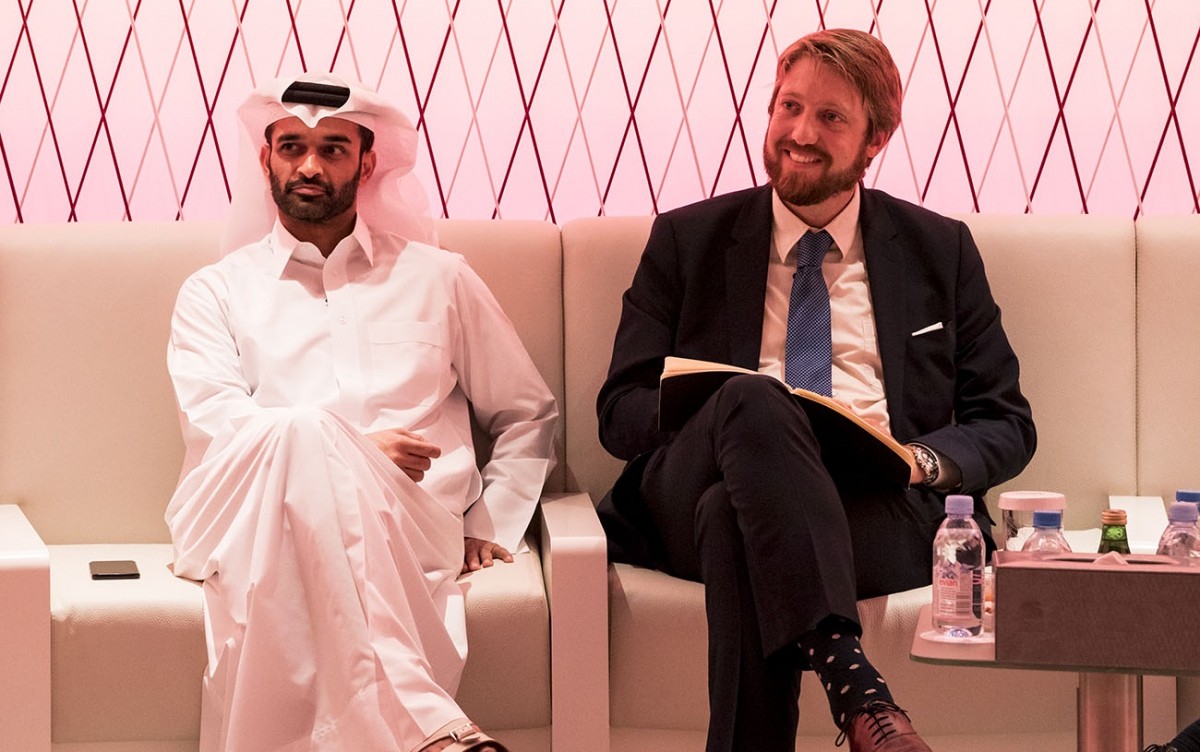.jpg)
_1-itok=GFMKQ6A9.jpg)
Qatar's Community of Practice for Behavioural Economics initiative has completed its second session, with Daniel Shephard, a former member of the White House Social and Behavioral Sciences Team (SBST), co-founder and president of the Implementation Science & Communication Strategies (IS-CS) Group, and member of the Board of Trustees of Nudge Lebanon, where he also serves as Senior Advisor, joining as guest host.
The community of practice was devised as a joint venture between the Supreme Committee for Delivery & Legacy's (SC) Qatar Behavioural Insights Unit (QBIU) and Qatar Foundation in April 2018 – with the aim of promoting and sharing knowledge and best practices about behavioural economics in Qatar.
The QBIU, launched by the SC in 2016, leads policy experimentation – in areas such as healthy lifestyles, sustainability, workers' welfare and entrepreneurship – that will support the successful delivery of the 2022 FIFA World Cup™ and steer Qatar and the region towards a better future, in line with the goals of Qatar National Vision 2030.
As part of its commitment to achieving this goal, it launched the community of practice in partnership with Qatar Foundation to support Qatar's public policy ecosystem. Following the inaugural session – at which Professor Cass Sunstein, the founder and director of the Programme on Behavioural Economics and Public Policy at Harvard Law School was the guest host – the second installment took place within the majlis of the SC's Legacy Pavilion at Al Bidda Tower.
The 'Legacy Majlis' focused on the application of behavioural insights to education. Shephard, an expert in education and evaluation with over eight years' experience, led the discussion. Practitioners and experts in the area of education representing key entities in Qatar, such as Qatar Foundation and other private schools, Qatar Fund for Development, Generation Amazing and INJAZ, to name but a few, also attended the session.
The discussion – which was attended by SC Secretary General H.E. Hassan Al Thawadi, the former Minister of Information and Communications Technology, H.E. Dr. Hessa Al Jaber, and representatives from Qatar Foundation, Hamad Bin Khalifa University, Doha British School and Newton Schools – centered around two main topics: students' performance and the supporting environment around them, such as parents, teachers, nannies and coaches. Against this background, members of the community of practice identified a number of education challenges in Qatar and discussed how injecting behavioural insights could tackle these challenges.
Asked on the use of behavioural insights in a FIFA World Cup™ setting, Shephard stressed the pioneering work of QBIU in applying insights from behavioral sciences in the run-up to the 2022 FIFA World Cup™ to enhance sustainability, workers' welfare, entrepreneurship and education.
"The World Cup has created unique opportunities for welfare-enhancing behavioural insights work and will continue to do so. There are unique opportunities to use sports and the national pride associated with the World Cup to encourage hard work and positive self-images among students," he said. "The Generation Amazing programme at the SC, which is supported by the QBIU, is a very good example of these efforts, in particular by creating social impact through sport and using football to create behavioural change and transform lives and communities.
"Many countries strive to leave a legacy after hosting the World Cup, and the whole concept of using behavioural insights to address many of the challenges that the country and the region is facing is a great legacy."
He continued: "What Qatar is doing through its initiative stands out as pioneering. Many more countries will be looking to learn from this experience and use behavioural insights in future World Cup events and other mega sports events in the future. The US had already announced in its bid that it will also be using behavioural insights to advance various aspects of the World Cup in 2026."
Dr. Fadi Makki, Chief of the QBIU, also took time to thank Shephard for his contribution, noting this majlis was another enormously enjoyable and enlightening discussion.
He said: "QBIU is a fine example of how the 2022 FIFA World Cup is having a positive impact on Qatar and the region. We're very proud to be contributing to the success of the event and – more importantly – the legacy it leaves for Qatar, the region and the world. To have the opportunity to learn from and share knowledge with other high level experts continues to provide a wonderful opportunity for us all."

